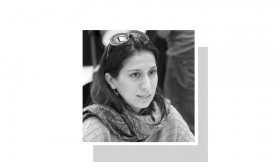 Mariam Chughtai is an Ed.D. Candidate at Harvard Graduate School of Education and Student Coordinator for SAI’s Pakistan Programs.
Mariam Chughtai is an Ed.D. Candidate at Harvard Graduate School of Education and Student Coordinator for SAI’s Pakistan Programs.
Hidden curriculum
By Mariam Chughtai, Dawn.com, August 30, 2014
In education, the term ‘hidden curriculum’ refers to indoctrination that occurs implicitly or through outright omission. National ideology, alienating narratives about the ‘other,’ and socio-political attitudes are cemented through hidden curricula. But beyond the educational triad of ‘textbooks, teaching, and testing’, the civic area where the hidden curriculum operates most effectively is national holidays when, regardless of participation, every citizen understands what is being celebrated and why.
Most recently, in the United States, the hidden curriculum of Columbus Day has come under scrutiny as people have begun to question whether American schoolchildren should be celebrating a man who is supposed to have plundered, maimed and enslaved innocent men and women, as a ‘hero’.
The very debate over the glorification of Christopher Columbus through a national holiday that subverts and conceals the uglier side of history teaches schoolchildren to critically examine tradition, and to realise that history is, at the very least, controversial.
On the other end of the spectrum are societies like North Korea where the death of their ‘Dear Leader’ produced reports of wailing bears and mourning birds to underscore the narrative of Kim Jong-il’s divinity. His son, the ‘great successor,’ Kim Jong-un’s birthday is celebrated as a national holiday. Called the ‘day of shining star’, gift bags are distributed among schoolchildren glorifying their leader’s ‘accomplishments’. Thus, North Korean schoolchildren learn to associate patriotism, citizenship and reward with a celebration of authoritarian rule and conformity.
